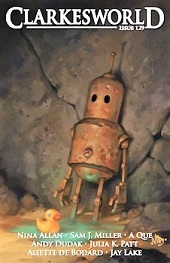“Fool’s Cap” by Andy Dudak
Reviewed by Rebecca DeVendra
Andy Dudak writes the mind-bending tale “Fool’s Cap.” There where points when I felt like my brain had been melted and hung over a clothesline. It was great. Most stories that try to write about time-loops and parallel universes fall into many paradoxical traps: this is the nature of the thing. Dudak handles these ingredients like a master chef. The story follows Beadith, a Tribunal agent chasing a killer, and she gets stranded on an island with him. Weak and helpless, he has given himself over to a sentient moss that affixes itself to his head and shows him several versions of himself. Beadith communes with the moss as well, and starts to converse with other versions of herself. Sound complicated? Because of this, sometimes the prose has to pull away from Beadith to explain what is happening. While that might make the story less evocative for some readers, it never stops being interesting.
Julia K. Patt’s “My Dear, Like the Sky and Stars and Sun,” is about body-mod inventors who blend technology and art. The characters do this to adorn themselves with biological enhancements. Elspeth is a regular tattoo artist who offers something more for the right people. Pratt tries to show us a world of bohemian misfits against the technocratic CEOs who patent everything. Instead of engaging in some sort of casuistry about the nobility of art and its age-old dependence on patronage, I’ll save myself and just remark that the story ends on a satisfactory note, castigating business-types and reaffirming art’s unspoken purpose. I will not define that, since I’m coy, but I’ll give you a hint: art shows us who we are. If we’re bad, well, let’s just say that Dorian Gray didn’t do too well either.
“Neptune’s Trident” by Nina Allan is a dark post-apocalyptic tale shot through with tension that never really crescendos. Allan’s sybaritic prose beguiled me, so much so that when I got to the end of the story I felt as if I’d had an odd dream, filled with a dread I couldn’t define. The story tells of an invasion by nonhuman beings that work through infection, making people sick. They are called “flukes” in the story and all sorts of political misfortunes befall them, from internment camps to executions. Allan’s world is full of suspicion and dread, and I admit I felt a bit flensed after being immersed in it.
Sam J. Miller tells a story in tight descriptions retrieved from surveillance clips in “The Ways Out.” The narrative view of the story is a pulled back, third-person, and fragmented voice that is a bit hard to find immersive at first. There are several segments where entire paragraphs are stuck through, which makes for hard reading. This does, however, build tension: I was rooting for the characters after seeing snippets of their conversations and hints of their inner goals, and wanted them to beat the system spying on them.
“An Account of the Sky Whales” by A Que and translated by Andy Dudak is richly imaginative yet dolorous in subject matter. On the one hand, we are treated to a world where whales soar in the skies like kites. On the other hand, the main character is travelling from Earth to retrieve the ashes of his girlfriend. This makes for a bittersweet and ultimately immersive tale that does not shy away from gruesome realities. Original and excellent on all counts, I was sorry to get to the end of the story.
Rebecca DeVendra is a figure artist and speculative fiction writer living in Boston. She grew up in Ohio and went to school there, and has a background in curriculum writing. She’s also a mom to three cacophonous, early-rising children. She’s probably in her pajamas, but she has an emergency collar shirt for video calls. Check out her blog.
 Clarkesworld #129, June 2017
Clarkesworld #129, June 2017